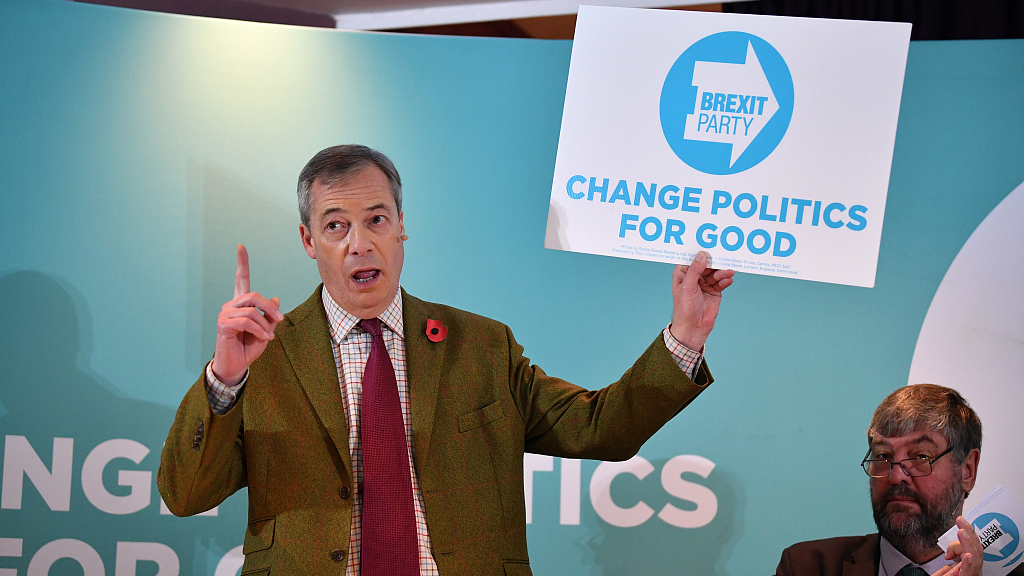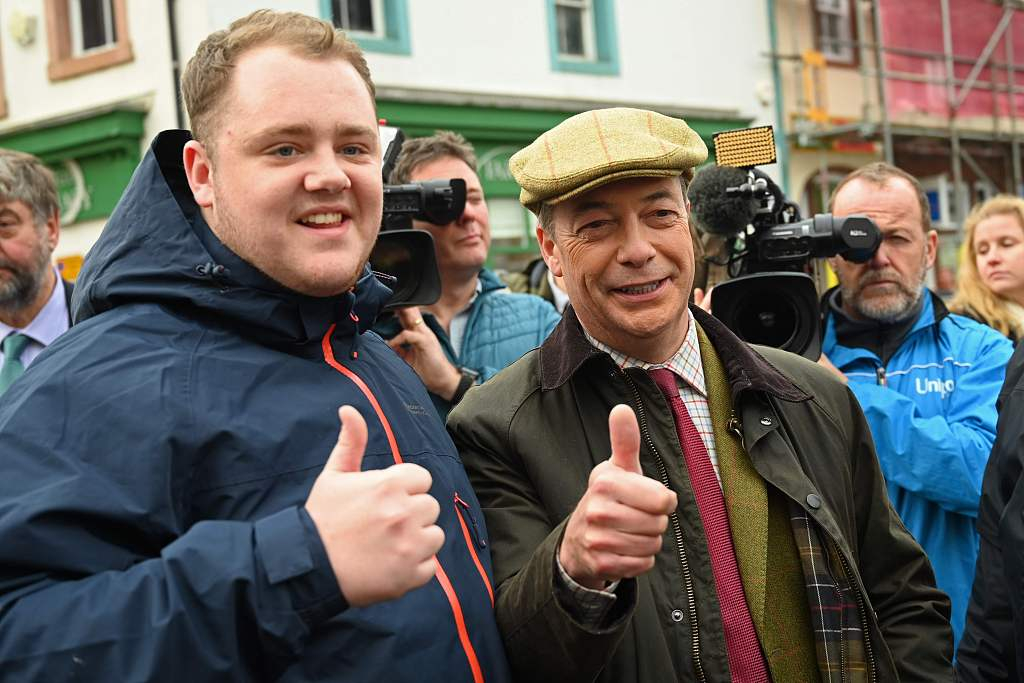
Brexit party leader Nigel Farage attends an election campaign event at Washington Central Hotel in Workington, England, November 6, 2019. /VCG Photo
Brexit party leader Nigel Farage attends an election campaign event at Washington Central Hotel in Workington, England, November 6, 2019. /VCG Photo
Editor's note: Thom Brooks is the dean of Durham Law School and a professor of law and government at Durham University. The article reflects the author's opinions and not necessarily the views of CGTN.
The UK's general election is being hailed the "Brexit election" by many commentators. Brexit is undeniably the biggest political issue affecting Britain. Who wins the election could determine what happens with, or to Brexit.
The different parties all have more or less clearly distinctly different offers to voters to select from. Parties like the Liberal Democrats want to cancel Brexit if elected. Labour takes a middle position vowing to agree a new deal and giving the public a final say on whether to leave the EU on their deal or Remain. Notwithstanding their differences, pro-EU campaigners have hoped a Remain alliance might be formed to maximize pro-Remain voters avoiding a Brexit outcome.
But there are differences on the Brexit side too. The Tories claim they will deliver Brexit – deal or no deal – if elected come what may. Their pitch to voters is damaged by the weeks of promises that there would be no extension and the UK out of the EU by 31 October only to have this all fall to pieces and come undone.
Competing for the Brexit vote is the Brexit Party headed by long-time Eurosceptic campaigner Nigel Farage. Farage and his Brexit Party have come under enormous pressure to not contest seats the Tories need to win a majority. A Brexit alliance is thought necessary to counter their pro-Remain opponents and bring the vote of the EU referendum to a conclusion.
To the surprise of some and horror to Conservative Party HQ, Farage has vowed to contest 600 of 650 seats in the House of Commons. This will include many marginals and areas the Tories hoped to win, like Hartlepool across the UK.
This move has infuriated the Tories because the Brexit Party is a drain mostly on Tory voters. There is much less of a swing from Labour to Brexit Party. The probability is that even if Labour or Liberal Democrats came a distant second in the polls, they could still win seats and a Labour majority as Farage splits the Brexit vote.

Brexit Party leader Nigel Farage poses for a photograph with a supporter in the street at the start of a nationwide tour for the 2019 general election, in Whitehaven, Cumbria, northwest of England, November 6, 2019. /VCG Photo
Brexit Party leader Nigel Farage poses for a photograph with a supporter in the street at the start of a nationwide tour for the 2019 general election, in Whitehaven, Cumbria, northwest of England, November 6, 2019. /VCG Photo
Farage's challenge should come as no surprise. He's in this for the long game and the big prize – and seems happy to sacrifice Brexit to get it. His main aim appears almost certainly to end the Tories as the mainstream party of the political right. He just might succeed.
If the Tories lose big (and this could happen if the Brexit Party is effective), they will be seen as the party that promised Brexit but dithered, delayed and failed. A Labour government or coalition would almost certainly soften Brexit if not lead to the plug being pulled through a popular vote.
This will be music to Farage's ears as he could then claim – as the party of No Deal Brexit – that they are the uncompromising Brexit voices the Tories never were and the only party dedicated to fulfilling the EU referendum result.
Key here is that Brexit is only a means to an end, not the end itself. If Farage was truly dedicated to Brexit happening, he'd stand his troops down immediately. If he genuinely believed he knew best how to deliver Brexit, he would not have resigned live on television within hours of the referendum result being confirmed – or refused to run as a MP in this election.
Such political strategic decisions make more sense if Brexit is not his main goal, but a means to the big prize of making himself and his party the new dominant political party of the British right. So standing against Conservatives, helping ensure they lose and Brexit fails are all key to this larger aim.
In short, the Brexit Party seems intent on ensuring Brexit doesn't happen now or in the future. But this was probably never its true point. More revealing is the fact we've seen no manifesto from them or announcements of any policies beyond simply claiming to want a No Deal Brexit. It makes one wonder if they have any vision for what they'd actually do with power – and, if so, why they fear sharing this with the public while canvassing for votes.
(If you want to contribute and have specific expertise, please contact us at opinions@cgtn.com)